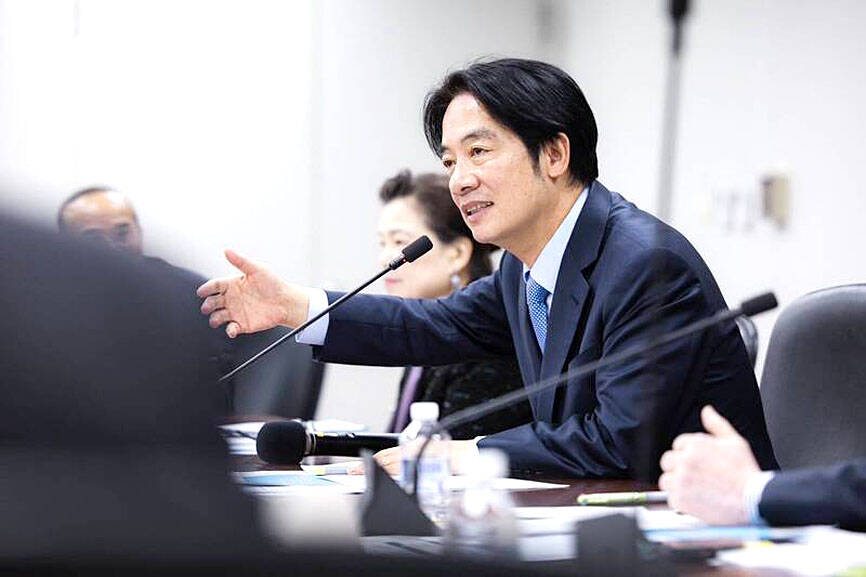The standing of international guests attending president-elect William Lai’s (賴清德) inauguration ceremony on May 20 would determine Beijing’s reaction to the event, including holding military exercises or dispatching a large number of aircraft to harass Taiwan, an expert said on Thursday.
“I expect things to possibly get worse in the lead-up to William Lai’s inauguration ... especially depending on who from outside Taiwan attends,” Thomas Shattuck, non-resident research fellow with the Global Taiwan Institute, told a seminar held by the institute.
High-level attendees might prompt China to hold military drills or large-scale aerial incursions, he said.

Photo: Chen Yun, Taipei Times
Beijing has this year launched relatively fewer large-scale aerial incursions in comparison with the past few years, he said.
It might be an attempt to avoid raising concerns about cross-strait stability in the run-up to Taiwan’s presidential election on Jan. 13, as alarming the public might sway voters toward Lai, he said.
Beijing might also turn its attention to a “new mechanism to coerce Taiwan at sea,” such as frequently sending China Coast Guard vessels to waters near Kinmen after an incident in which two Chinese fishers died while being pursued by a Taiwanese Coast Guard Administration vessel last month, he said.
By conducting regular patrols, drills and inspections, Beijing is “normalizing its presence” in disputed waters in preparation for taking control of the area, said Lee Sze-fung (李紫楓), a former analyst at the Canadian Ministry of Foreign Affairs’ Global Affairs Canada.
China is likely to prolong and expand its presence in the Taiwan Strait and would be “seizing effective control in the area in a very short, near future” if it is met with no “high pace, effective countermeasures,” she said.
When Beijing is able to exercise control, the “only step left is an invasion to take full control of the island and Taiwan itself,” she said.
The Chinese gray-zone tactics work as they exploit “the greatest weakness between liberal democracies,” which is “a lack of consensus on what constitutes war or a clear threshold of unacceptable behaviors,” she said.
Lee called for a “comprehensive approach of cross-domain deterrence” to facilitate discussions among democracies on countermeasures against Beijing.
To counter China’s coercive behavior, Taipei could look to Manila, which is “doing a very good job of publicizing it and creating international outrage,” Shattuck said.
Despite being much smaller in size and having limited resources, Taipei could use affordable drones to document Beijing’s aggression and use it to solicit support from international friends, who can in turn speak up for the nation and condemn such behavior at UN meetings or other occasions, he said.

CHANGING LANDSCAPE: Many of the part-time programs for educators were no longer needed, as many teachers obtain a graduate degree before joining the workforce, experts said Taiwanese universities this year canceled 86 programs, Ministry of Education data showed, with educators attributing the closures to the nation’s low birthrate as well as shifting trends. Fifty-three of the shuttered programs were part-time postgraduate degree programs, about 62 percent of the total, the most in the past five years, the data showed. National Taiwan Normal University (NTNU) discontinued the most part-time master’s programs, at 16: chemistry, life science, earth science, physics, fine arts, music, special education, health promotion and health education, educational psychology and counseling, education, design, Chinese as a second language, library and information sciences, mechatronics engineering, history, physical education

The High Prosecutors’ Office yesterday withdrew an appeal against the acquittal of a former bank manager 22 years after his death, marking Taiwan’s first instance of prosecutors rendering posthumous justice to a wrongfully convicted defendant. Chu Ching-en (諸慶恩) — formerly a manager at the Taipei branch of BNP Paribas — was in 1999 accused by Weng Mao-chung (翁茂鍾), then-president of Chia Her Industrial Co, of forging a request for a fixed deposit of US$10 million by I-Hwa Industrial Co, a subsidiary of Chia Her, which was used as collateral. Chu was ruled not guilty in the first trial, but was found guilty

DEADLOCK: As the commission is unable to forum a quorum to review license renewal applications, the channel operators are not at fault and can air past their license date The National Communications Commission (NCC) yesterday said that the Public Television Service (PTS) and 36 other television and radio broadcasters could continue airing, despite the commission’s inability to meet a quorum to review their license renewal applications. The licenses of PTS and the other channels are set to expire between this month and June. The National Communications Commission Organization Act (國家通訊傳播委員會組織法) stipulates that the commission must meet the mandated quorum of four to hold a valid meeting. The seven-member commission currently has only three commissioners. “We have informed the channel operators of the progress we have made in reviewing their license renewal applications, and

Taiwan-based publisher Li Yanhe (李延賀) has been sentenced to three years in prison, fined 50,000 yuan (US$6,890) in personal assets and deprived political rights for one year for “inciting secession” in China, China's Taiwan Affairs Office spokesman Chen Binhua (陳斌華) said today. The Shanghai First Intermediate People’s Court announced the verdict on Feb. 17, Chen said. The trial was conducted lawfully, and in an open and fair manner, he said, adding that the verdict has since come into legal effect. The defendant reportedly admitted guilt and would appeal within the statutory appeal period, he said, adding that the defendant and his family have